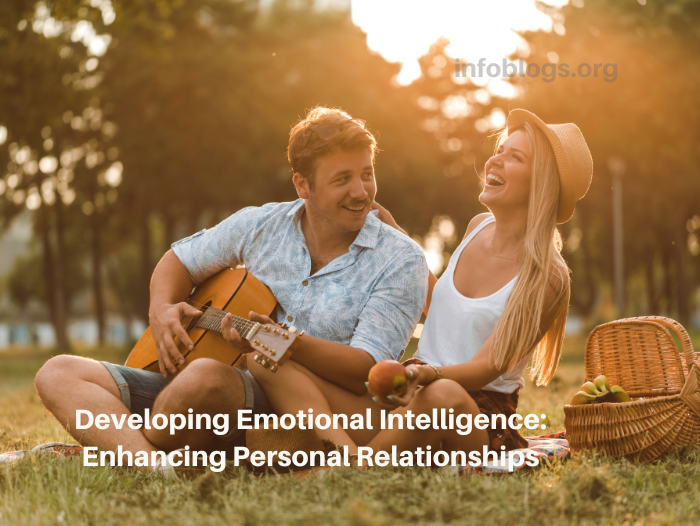Developing emotional intelligence is crucial in fostering and maintaining personal connections. It equips us with the ability to regulate our emotions, comprehend others' feelings, and communicate with sensitivity and kindness. By prioritizing emotional intelligence, we can look forward to enhancing personal relationships and establish more meaningful bonds. This article will delve into the significance of emotional intelligence and offer actionable tips for honing this skill.
Understanding Emotional Intelligence:
The development of emotional intelligence requires the recognition, understanding, and management of our own emotions, as well as the ability to empathize with and respond to the emotions of others. This includes self-awareness, self-regulation, empathy, and social skills. Acknowledging the importance of emotional intelligence is the initial stage towards its cultivation.
Cultivating Self-Awareness:
To develop emotional intelligence, one must first focus on enhancing self-awareness. This involves being mindful of one's own emotions, thoughts, and responses in diverse situations. It is crucial to take time for introspection and contemplation, to comprehend one's triggers, strengths, and areas that need improvement. By increasing self-awareness, individuals can gain a deeper understanding of how their emotions impact their relationships.
Managing Emotions:
To have emotional intelligence means to efficiently handle our emotions. Acquire the ability to identify and control your emotions in a positive manner. Utilize methods like meditation, breathing exercises, or writing to cope with intense feelings. As you enhance your emotional regulation, you will be able to interact with others with compassion and comprehension instead of acting on impulse.
Empathy and Perspective-Taking:
Developing empathy is a crucial aspect of emotional intelligence. It involves making an effort to comprehend the viewpoints and encounters of others. This can be achieved by actively listening, displaying sincere interest, and posing open-ended inquiries. Empathizing with others necessitates putting oneself in their position and acknowledging their emotions. Empathy promotes bonding, confidence, and more meaningful interpersonal connections.
Effective Communication:
To establish and preserve healthy relationships, communication plays a crucial role. One can enhance their communication abilities by articulating their thoughts and feelings confidently, while also being open to differing viewpoints. Utilizing “I” statements to convey one's emotions and requirements without assigning blame is recommended. Practicing active listening, which involves paying attention to both verbal and non-verbal indicators, is also necessary. Stronger emotional bonds are formed through effective communication.
Conflict Resolution and Problem-Solving:
In relationships, it is certain that there will be conflicts. However, by acquiring emotional intelligence, you can gain the ability to handle conflicts efficiently. You can acquire techniques for resolving conflicts positively, like active listening, searching for commonalities, and discovering solutions that benefit everyone. By managing conflicts with empathy, comprehension, and respect for different opinions, you can deal with them. Finally, view problems as chances for growth and teamwork in problem-solving.
Practicing Emotional Regulation:
Regulating emotions during difficult situations is a crucial aspect of emotional intelligence. One should develop the skill of managing stress, frustration, and anger in a constructive manner. Adopting healthy coping mechanisms like exercising, meditating or pursuing hobbies can be helpful. Taking care of oneself is also important for emotional well-being. By mastering the art of regulating emotions, one can interact with others in a more balanced and considerate way.
Building Social Skills:
Developing and nurturing personal relationships requires essential social skills. To enhance these skills, one can practice active listening, empathy, and assertive communication. Additionally, improving the ability to read social cues and adapt to different social situations is crucial. Building rapport, displaying interest in others, and practicing good manners are also important. By building strong social skills, a positive environment for meaningful connections can be created.
Reflecting and Learning from Relationships:
Frequently contemplate your engagements and encounters in your connections. Gain knowledge from favorable and arduous experiences. Recognize trends, abilities, and domains for development. Solicit evaluations from dependable individuals to understand how you can boost your emotional intelligence. Utilize this input to incessantly enhance your relationships.
Cultivating Empathy and Compassion:
Nurture a mentality of empathy and compassion for others by exhibiting random acts of kindness, demonstrating empathy for their challenges, and extending assistance when necessary. Developing empathy and compassion promotes confidence, comprehension, and more profound bonds in interpersonal connections.
Conclusion:
Enhancing personal relationships is a notable benefit of embarking on a lifelong journey to develop emotional intelligence. This can be achieved through various practices such as cultivating self-awareness, regulating emotions, practicing empathy, improving communication, resolving conflicts, building social skills, reflecting on relationships, and fostering empathy and compassion. By investing in the development of emotional intelligence, you can establish meaningful connections with others and improve your overall well-being.


